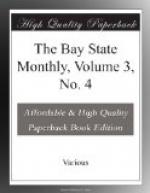“Ye Deputies in perusal of ye Acts of ye Hon. Court of Assistants relating to ye woman condemned for witchcraft doe not understand why execution of ye sentence given her by ye sd. court is not executed. Her repreeval seems to us to be beyond what ye law will allow, and doe therefore judge meete to declare ourselves against it, etc. This Nov. 3d., 1680.
“WM. TORREY, Clerk.”
Then follows this entry:—
“Exceptions not consented to by ye magistrates.
“EDWARD RAWSON, Secretary.”
Mrs. Morse continued in prison until May 1681. On the fourteenth of that month her husband petitioned for her to “the honorable gen. court now sitting in Boston,” begging “to clere up ye truth.” This petition recites a review of the testimony of seventeen persons who had testified against Goody Morse. On the eighteenth, he petitioned “ye hon. Governor, deputy Governor, deputies and magistrates.” In answer, a new hearing was granted. The court record says:—
“Ye Deputyes judge meet to grant ye petitioner a hearing ye next sixth day and that warrants go forth to all persons concerned from this court, they to appear in order to her further trial, our honored magistrates hereto consenting.
“WM. TORREY, Clerk.”
Again the magistrates were refractory, for we find:—
“May twenty-fourth, 1681:—Not consented to by ye magistrates.
“EDWARD RAWSON, Secretary.”
No further trial followed. Mr. Morse did not rest in his efforts for the release of his wife. He called a council of the clergymen of the neighborhood to examine her. The council met and acted. The report of the Rev. John Hale of Beverly (probably chairman) is before me. It reads:—
“This touching Madam Elizabeth Morse:—
“She being reprieved, her husband desired us to discourse her, which we did. Her discourse was very christain, and she still pleaded her innocence of that which was laid to her dischage. We did not esteem it prudence for us to pass any definite sentence upon on under her circumstances, yet we inclined to ye more charitable side.”
After this examination the court permitted her to return home, when she never gave further occasion for slander, dying the death of a hopeful Christian not many years after.
And the mischievous grandson, what of him? He went to Beverly, married, had children, died. His great-great-grandson lives to-day. He, descendant of William, over wires that Anthony’s descendant made to do noble work, sends this message, written on paper made by a descendant of Robert, to Miss Russell, representing Samuel Morse and Oliver Cromwell:—
“After two centuries witch-work
is in electricity, and that witch-work
has made us a name.”
* * * * *




